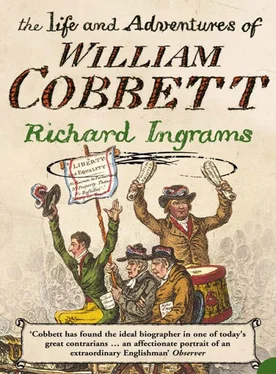WITH ONLY a short interval in 1792, Cobbett had been away from England for sixteen years, and on his return he was struck by how everything – ‘the trees, the hedges, even the paths and woods’ – seemed so small in comparison with New Brunswick and America. After a month in London he revisited Farnham. His parents had died, and his two brothers (the third had joined the East India Company) were in financial difficulties. ‘They are obliged to work very hard,’ he wrote to Thornton, ‘and their children are not kept constantly at school – I have given them a lift on and am devising means for making a provision for some of their sons – Never till now did I know the value of money.’
As the coach neared his old home Cobbett was overcome with mixed emotions and memories. ‘My heart fluttered with impatience mixed with a sort of fear to see all the scenes of my childhood, for I had learned before, the death of my father and mother … But now came rushing into my mind, all at once, my pretty little garden, my little blue smock-frock, my little nailed shoes, my pretty pigeons that I used to feed out of my hands, the last kind words and tears of my gentle and tender hearted and affectionate mother! I hastened back into the room! If I had looked a moment later I would have dropped. When I came to reflect, what a change! What scenes I had gone through! How altered my state … I felt proud.’
Cobbett had every reason to feel proud. As his reception at Falmouth indicated, he had returned to England a famous man. His anti-Jacobin pamphlets, all of them published in London, had been widely read and appreciated, especially by those politicians opposed to the French Revolution and now keen on prosecuting the war against Napoleon. William Windham, who was to become Cobbett’s close friend and patron, said in the House of Commons that he merited for his services in America ‘a statue of gold’. * Instead Cobbett commissioned a portrait by J.R. Smith, and this was engraved by the most fashionable engraver of the day, Francesco Bartolozzi, and put on sale in the London print shops. It shows the thirty-seven-year-old journalist looking supremely energetic and confident, ready to take on all comers from Napoleon downwards.
But the country that Cobbett had returned to was weary of the war. After nine years little had been done to restrain the march of the French across Europe, whilst at the same time the expense of the war had placed enormous tax burdens on the people (it was during this first period of hostilities that income tax was first introduced by the Prime Minister William Pitt). The pressures on the government to reach an agreement became too great, and in 1802 the Peace of Amiens was signed by the new Prime Minister Henry Addington (Pitt was awaiting developments at Walmer Castle in Kent). Persuading themselves that Napoleon had restored order to France and that the threat of Jacobinism was no more, the British people rejoiced. But a small group of politicians, implacably opposed to Napoleon, courted Cobbett. He had already been entertained only a few days after his arrival from America at a dinner given by William Windham and attended by Pitt and the future Foreign Secretary and Prime Minister George Canning. One can imagine Cobbett’s intense feeling of pride at finding himself dining with the Prime Minister when only a few years previously he had fled the country, a wanted man facing possible trial at a court martial. Cobbett was more than willing to assist the anti-peace campaign, but he remained adamant that he would never in any circumstances become a tool of the government.
This decision, immensely important in determining the course his career was to take, was not dictated entirely by principle, but by prudence and even commercial considerations. From his experiences in America Cobbett knew not only that he could attract a large readership for his paper even amongst those who disagreed profoundly with his politics, but also that his popularity was due as much to his writing skill as to the fact that his readers valued his independence in a society where the bulk of journalism was written by paid hacks. In England at this time the press comprised a number of small four-page papers with circulations of only two or three thousand, all heavily dependent on advertising and government subsidy (either in the form of advertisements or direct payments). It was only later, with the progress of The Times , that something resembling a modern newspaper emerged, commercially and editorially independent of the government. At the beginning of the century, when Cobbett returned to England, the links between politicians and the press were closer and more corrupt than they have ever been, before or since. The spread of radical opinions in the wake of the French Revolution had encouraged the view in conservative circles that the press was in some way responsible, and that steps must be taken to curb its powers either by taxation or by making papers and individual journalists and pamphleteers dependent on the government for their continued existence. The result was that almost all writers, not merely journalists, ended up in the pay of the state. As Cobbett wrote later:
The cause of the people has been betrayed by hundreds of men, who were able to serve the people, but whom a love of ease and of the indulgence of empty vanity have seduced into the service of the bribing usurpers, who have spared no means to corrupt men of literary talent from the authors of folios to the authors of baby-books and ballads, Caricature-makers, song-makers all have been bribed by one means or another. Gillray and Dibdin were both pensioned. Southey, William Gifford all are placed or pensioned. Playwriters, Historians . None have escaped. Bloomfield, the Farmer’s Boy author, was taken in tow and pensioned for fear that he should write for the people. 1
And the rewards could be very considerable. Cobbett noted later that one journalist, John Reeves, a clever lawyer of whom he was very fond, left £200,000 when he died – ‘without hardly a soul knowing that there ever was such a man’. For Cobbett, with his huge following, nothing was too much. The government offered him the editorship of either of its two papers, the Sun and the True Briton , along with the office and the printing press and the leasehold of a house, the whole package worth several thousand pounds. He refused. ‘From that moment,’ he wrote, ‘all belonging to the Government looked on me with great suspicion.’
An exception was William Windham. Born in 1750, Windham was an unlikely politician, a rich Norfolk landowner from Felbrigg near Cromer, where his family had lived since the Middle Ages. Educated at Eton and University College Oxford, he was not only a classical scholar, but also an amateur mathematician who had been deeply influenced by his friendships with Edmund Burke and Dr Johnson. It was Johnson who, when Windham was debating whether to accept a political appointment in Ireland, famously urged him to go ahead, saying that he would ‘make a very pretty rascal’. Windham later visited Johnson on his deathbed and agreed to become the guardian of his black servant Francis Barber. At the same time Johnson secured his promise that he would devote one day a week to a consideration of his failings. ‘He proceeded to observe,’ Windham wrote, ‘that I was entering upon a life that would lead me deeply into all the business of the world: that he did not condemn civil employment but that it was a state of great danger; and that he had therefore one piece of advice earnestly to impress upon me – that I would set apart every seventh day to the care of my soul: that one day, the seventh, should be employed in repenting what was amiss in the six preceding and justifying my virtue for the six to come: that such a portion of time was surely little enough for the meditation of eternity.’
Читать дальше











